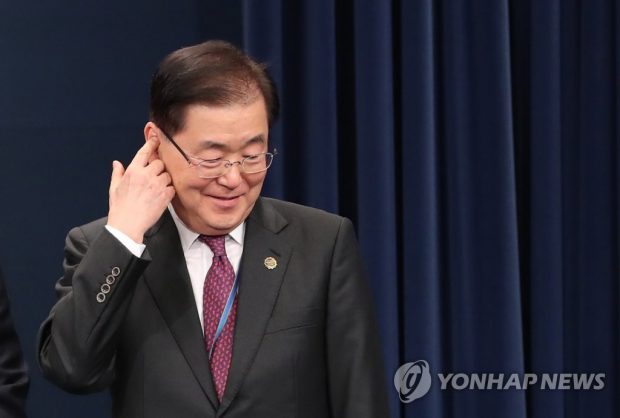
South Korea expresses strong regret over Japanese distortion of military pact deal

Busan: South Korea and Japan clashed Sunday over an agreement on keeping their military information-sharing pact alive, casting a pall on upcoming negotiations over their monthslong trade row stemming from shared history.
Japan’s Prime Minister Shinzo Abe reportedly claimed that Tokyo has not made a single concession, while the office of President Moon Jae-in said this is not true.
The renewed rift, which apparently shows a lingering mutual mistrust, came just two days after South Korea conditionally suspended the expiry of the General Security of Military Information Agreement (GSOMIA), six hours before it was due to lapse.
South Korea also decided to temporarily halt a complaint process at the World Trade Organization while negotiations with Japan on the two sides’ export control policies continue.
“In the future negotiations, everything depends on Japan’s attitude,” Chung Eui-yong, director of Cheong Wa Dae’s national security office, told reporters at an exhibition center in the southeastern port city of Busan, noting South Korea’s recent decisions are conditional and provisional.
A key condition of the suspension is that South Korea can terminate the military pact at any time it wants and Japan has expressed “understanding” over it, according to South Korea.
South Korea suspected officials in Japan could have leaked their recent deal to Japanese media, said Chung, noting that Japanese media reported parts of the deal about one hour before their scheduled joint announcement on Friday by citing unidentified senior Japanese officials.
Chung said South Korea and Japan had agreed to make a joint announcement of their deal at 6 p.m. on Friday, but Japan made an announcement several minutes later.
He also said the Japanese Ministry of Economy, Trade and Industry intentionally distorted or exaggerated Japan’s side of the deal, and Japan offered an apology to South Korea through a diplomatic channel over its exaggerated announcement.
“We have no choice but to express deep regret” over the Japanese behavior, Chung said, calling the Japanese moves a “breach of faith.”
Chung said the government formally took issue with Japan’s attitude via a diplomatic channel and added that Tokyo offered an “apology.”
However, a Japanese ministry official denied Chung’s statement, according to the Yomiuri Shimbun, a major local daily.
The newspaper reported that the South Korean administration is facing criticism that it has made unilateral concessions.
“Its aim seems to be evading criticism at home by filing a complaint against Japan (over the matter),” it said.
Chung also slammed Japanese leaders for their reported remarks that South Korea caved in to U.S. pressure and that Japan had achieved a diplomatic victory, describing the comments as untrue.
A senior presidential official also said it would be very disappointing if Abe’s reported comments are true. Japanese media reported that Abe said Japan had made no concessions.
The development suggested that South Korea and Japan would face difficulties in their negotiations on the military pact and Japan’s export curbs.
South Korea has repeatedly pressed Japan to lift its export restrictions of three materials critical for the production of semiconductors and flexible displays. Japan later removed South Korea from its list of trusted trading partners.
South Korea views the Japanese moves as retaliation against last year’s South Korean Supreme Court rulings ordering Japanese firms to compensate South Korean victims of forced labor during Japan’s 1910-45 colonial rule of the Korean Peninsula.
YONHAP


